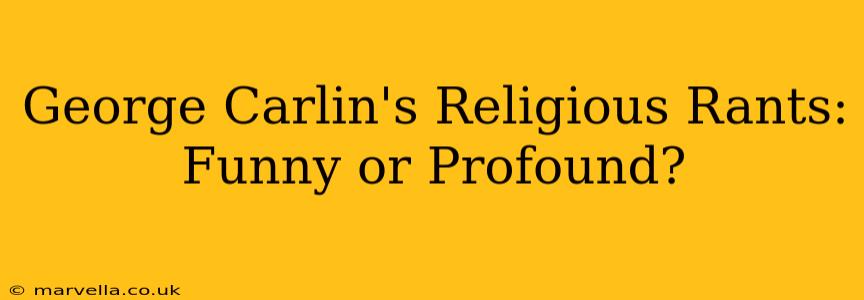George Carlin, the undisputed master of observational comedy, wasn't shy about tackling religion. His routines on faith, often laced with profanity and delivered with his signature sardonic wit, sparked both uproarious laughter and heated debate. Were his religious rants simply comedic, or did they hold a deeper, more profound message? The answer, like much of Carlin's work, is multifaceted.
His critiques weren't directed at individual believers, but rather at organized religion, its hypocrisy, and its impact on society. He dissected the inconsistencies, the contradictions, and the often-absurd rituals with surgical precision, leaving audiences simultaneously shocked and amused. But beneath the laughter, a sharp intellect questioned power structures and societal norms.
Was George Carlin Anti-Religious?
This is a common question, and the answer is nuanced. Carlin wasn't necessarily anti-religious in the sense of opposing all forms of spirituality or personal faith. His targets were the institutions, the dogma, and the way religion was used to control and manipulate people. He frequently distinguished between personal spirituality and organized religion, suggesting a more open-minded approach to personal belief systems outside the rigid structures of established faiths.
What were his main criticisms of religion?
Carlin's criticisms often centered on several key points:
- Hypocrisy: He relentlessly exposed the hypocrisy he perceived within religious institutions, highlighting the gap between professed values and actual actions of religious leaders and followers.
- Control and Manipulation: He saw religion as a tool used to control individuals and maintain power structures, often through fear and guilt.
- Blind Faith and Dogma: Carlin questioned the acceptance of dogma without critical examination, advocating for independent thought and questioning authority.
- The Use of Fear and Guilt: He highlighted how religion often leverages fear of damnation and guilt to control behavior, rather than promoting genuine compassion and understanding.
- The Absurdity of Rituals: Many of his routines playfully mocked the often-bizarre and seemingly illogical rituals and practices within various religions.
What made his religious commentary so effective?
Carlin's genius lay in his ability to blend scathing social commentary with side-splitting humor. His delivery, sharp and precise, amplified the impact of his observations. He wasn't just telling jokes; he was provoking thought, challenging assumptions, and encouraging critical thinking. This approach allowed him to reach a wider audience than a purely academic or philosophical critique might have.
How did his audience react to his religious rants?
Reactions were varied. Some found his routines hilarious and insightful, agreeing with his criticisms of religious institutions. Others were deeply offended, viewing his commentary as disrespectful or blasphemous. This polarization itself highlights the power of his work to provoke strong reactions and spark meaningful dialogue—even if uncomfortable—about religion's role in society.
Are George Carlin's religious rants still relevant today?
Absolutely. While the specific examples he used might be dated, the underlying themes of hypocrisy, control, and the dangers of blind faith remain strikingly relevant in today's world. His work serves as a timeless reminder to question authority, think critically, and examine the power structures that shape our lives. Whether you find his humor biting or his observations profound, Carlin's legacy as a social critic remains undeniable. His exploration of religion's influence continues to spark debate and encourage critical reflection on the role of faith in modern society.
This enduring relevance is a testament to the power of his observations and the ongoing need for critical engagement with religious institutions and their impact on society. His comedic approach made complex issues accessible, and his sharp wit ensured his message resonated with a broad audience. Whether you find his routines "funny" or "profound," or both, there's no denying their impact.

